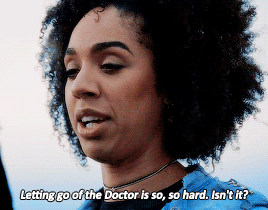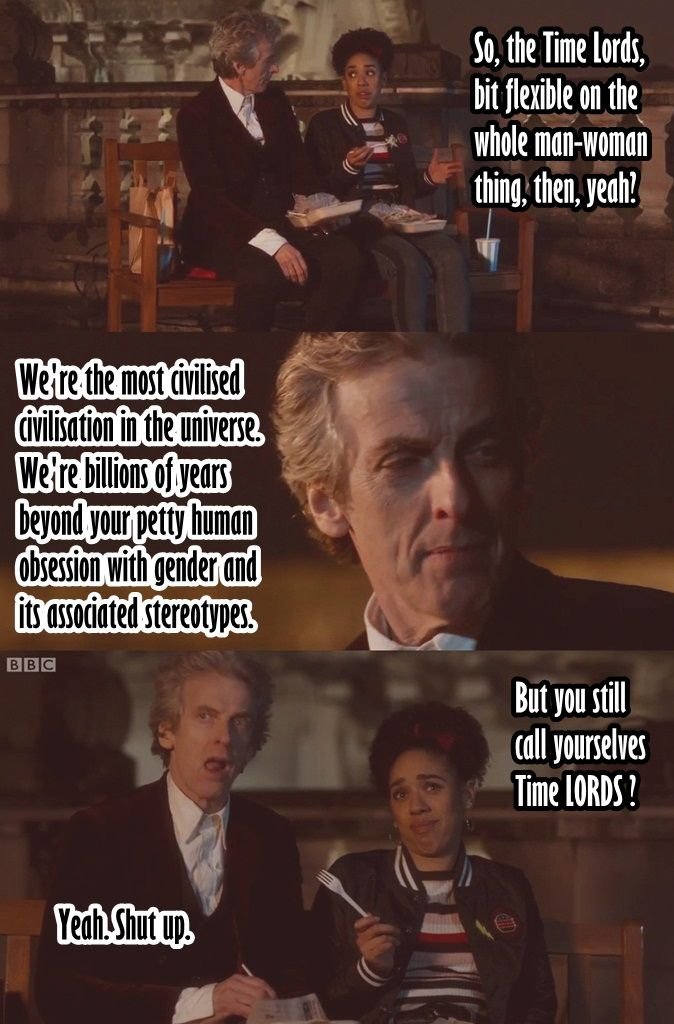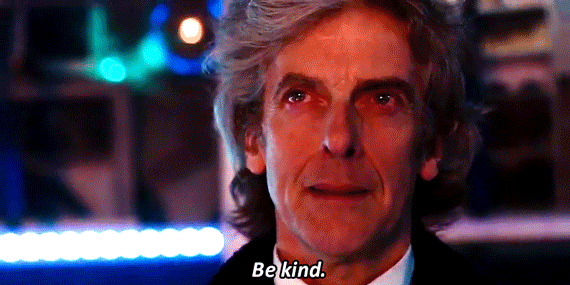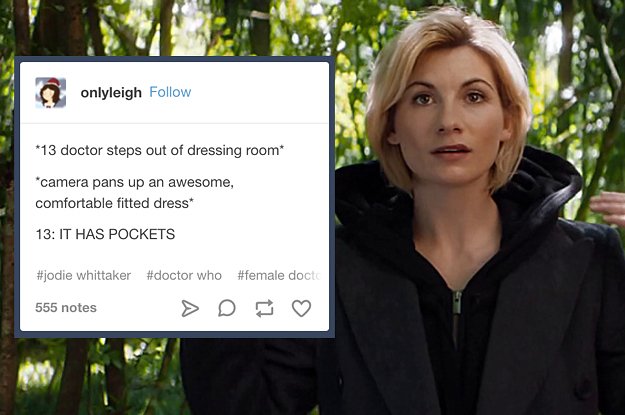Conceived in a time when women were objectified and underestimated, The Doctor has managed to regenerate beyond gender biases. Can the audience?

SPOILER WARNING: If you have yet to watch the Doctor Who Christmas Special "Twice upon a time" and do not wish to be spoiled till you do, just bookmark it and come back to read it after you've watched the episode. Otherwise, here come all the

The trauma of regeneration
The lives of Time Lords are a curious thing. They experience death and are reborn a dozen (or more) times over centuries, each time turning into a different person who just happens to carry the memories of their previous self. No Doctor ever welcomed regeneration and the cycle of death and rebirth that is part of Time Lord existence, and this year's Christmas special is, in many ways, about that.
Regeneration isn't only hard on The Doctor, but it can be emotionally taxing for the audience as well. The Doctor, versatile and lovable as he always is, became part of us. And then he died, replaced by another we learn to love until they too pass. The cycle goes on and this time it shook the fandom deeper than ever before with The Doctor regenerating, for the first time in the series (canon) history, in female form.

Previously this type of transformation happened only in fanfiction and porn parodies. So I believe that the showrunners choice to give The Doctor a woman's face and voice in this regeneration, just in time for 2018, is a sign of the times. But why is this regeneration harder for the conservative Whovians to accept than any previous change of actor and Doctor character?

The crotchety man in the box
In "Twice Upon a Time" we get a two for one deal, with both the 1st doctor and the 12th faced with the same fear of regeneration - fear of extreme change that is both terrifying and inevitable. Mid-regeneration, both are trying to escape its outcome, and both eventually give in and accept it.
To me, the loud minority of conservatives screaming that a female Doctor would be the end of the show, and is an attempt by the BBC to brainwash children with feminism are just that - dying men scared of letting go of the Doctor as he is, and allowing him to change. In a reply to all the naysayers claiming that a female Doctor would rob little boys of a role model, Colin Baker (the 6th Doctor) said: "You don't have to be of a gender to be a role model."

Fortunately, the majority of fans embraced this regeneration and evolution in the series and its main character, but that loud minority still needs to come to terms with Jodie Whittaker as the Doctor. At least, that is what the showrunners believe.
One does not have to be an old Whovian or watch any pre-2005 episodes of the series to see the clear difference between the first Doctor, originally described in 1963 as "a crotchety man in a Police Box" and the 12th Doctor played by Peter Capaldi. This difference becomes especially clear when the character of previously deceased Bill Potts makes her entrance.

The interaction between the 1st Doctor and Bill is fascinating, giving perfect contrast to the change in The Doctor's perception of gender since the 1960s. There is Bill, a black lesbian companion of The Doctor, refusing to clean the TARDIS, and rather amused by the 1st Doctor's threats to give her a good spanking. It seems the character of the WWI soldier in the episode was there, at least in part, to give the 1st Doctor someone to share the outdated outlook at women with.
That gentle poking at the subtle misogyny and sexism of the 60s era Doctor is not just there for comic relief. In fact, it might just be the most important takeaway from the episode. The contrast between the conservative 60s Doctor, and the fresh female face of Doctor 13 is almost too blunt in making its point.
Forget it or not?
It would probably be easier for the Doctor to try and repress his past. Not only the terrible things he has done as The War Doctor, but the way he regarded women over the years. The 12th Doctor doesn't even try to excuse his previous self's obvious misogyny when the 1st Doctor threatens Bill with a "smacked bottom" for calling the Doctor a "stupid arse". He would rather ignore it and forget it. He asks Bill if they can just pretend it never happened. Can we pretend the Doctor was never as misogynistic as the rest of our culture half a century back?
Doctor: "Can we just never ever talk about it again?"
Bill: "Oh I hope we talk about it loads. That we spend years laughing about it."
So the goal here isn't to repress the old behaviors of past, but rather to deal with them by overcoming our shame and awkwardness, coming to a point where we can laugh about it instead of judging one another and our past selves. And we do, as an audience, we giggle at the 1st Doctor's and WWI soldier's response to the discovery that Bill is a lesbian. We cringe when the 12th Doctor makes excuses for having a guitar on the TARDIS. We remember, but the memory changes as time passes and WE change.
This episode deals, in many ways, with the role memories play in our lives. Bill's own acceptance of her death, along with her understanding that it is memories that make up who she really is, beyond her physical traits and biological characteristics has profound significance in the way the writers wanted us to perceive regeneration. The memories stay, so you are still YOU even if you die. She insists upon it, and through The Doctor's acceptance of memories as having eternal value, he is able to let go and allow himself to regenerate.
Our turn now

"Be kind," The 12th Doctor says in his final speech on the TARDIS. Perhaps more than ever, this line is directed at the audience watching The Doctor regenerate and plunge into a new era of change in gender perceptions and biases.
Will she crash? Will she be saved by a TARDIS full of bras? Is she still married to River even if the ring slips off? I can't wait to find out!

-=-=-=-
Notes: All images are property of their rightful owners and I intend no infringement. Also, bowties are cool.

